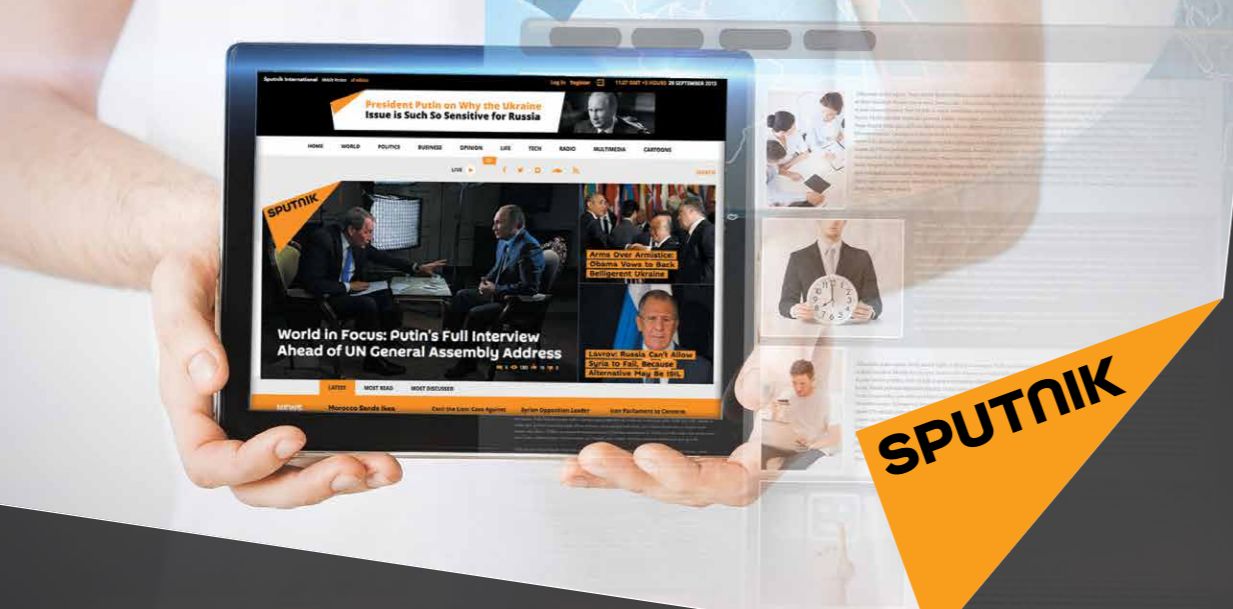A Kremlin backed Russian broadcaster with offices in Edinburgh made a series of attempts to build partnerships with Scottish journalism schools.
Responses to Freedom of Information requests show that last year Sputnik unsuccessfully approached journalism departments at the universities of Glasgow Caledonian, Stirling, West of Scotland and Edinburgh Napier, seeking to establish partnerships.
In response, one critic of Sputnik said it would have been inappropriate for credible journalism schools to have linked up with a media outlet accused of disseminating Russian propaganda.
Sputnik is run by Rossiya Segodnya, a Russian state news agency. It was recently expelled from the Edinburgh Chamber of Commerce as part of a backlash against the influence of Russia in the UK.
Russian state media, including fellow English-language broadcaster RT, has been accused of failing to speak out about the murders of journalists in Russia and not protecting press freedom.
FOI replies show that Glasgow Caledonian and Stirling universities did not respond to Sputnik. But redacted documents show that staff from Edinburgh Napier visited Sputnik’s offices in Edinburgh’s west end before deciding not to pursue a partnership.
Internal email conversations between Edinburgh Napier staff reveal the “serious reservations” of one staff member, questions about potential “ethical issues” of a collaboration, and the opinion that Sputnik has a “reputation issue”.
But a Sputnik spokesperson defended its attempts to build “positive relationships” arguing it had been unfairly “vilified” as an “agent of subversion” and a Kremlin “propaganda machine”.
Scottish Green MSP Andy Wightman said the high numbers of journalists killed in Russia – amid Russian state media silence – makes Sputnik an unpalatable partner for Scotland’s journalism schools.
According to the Committee to Protect Journalists, 58 journalists have been killed in Russia since 1992, but Wightman argued there has been little coverage by state funded media.
“Journalists are being murdered . By and large, RT doesn’t cover these stories at all,” Wightman said.
“That’s a kind of acid test of a free media: that, without fear or favour, regardless of its own particular perspective, it recognises that the freedom and independence of journalists to do their jobs is a given”, he added.
A key issue, Wightman said, lies in the 2013 a Russian presidential decree which established Rossiya Segodnya (Russia Today) which operates Sputnik.
Paragraph 4(a) of the December 2013 decree, which can be found in Russian on the Kremlin website, states: “The fundamental direction of activity of ‘Rossiya Segodnya’ is reporting the state policy of the Russian Federation, and public life in the Russian Federation, abroad.”
Wightman said that Sputnik “is basically an arms-length communications department of a government”.
He added: “It behaves as if it is an independent news outlet, but its founding principles are to actually communicate the policies of the Russian Federation’s government.
“In that sense Sputnik stands apart for me, and I do not think it would be appropriate for it to be taking part in any credible journalism programme.”
In reply, Sputnik said: “It would be inaccurate to say that Sputnik was founded by a presidential decree in 2013, when Sputnik was not launched until 2014. There is actually no mention of Sputnik in a decree you are probably referring to – the one about reorganising RIA Novosti agency.”
Sputnik added: “To our regret, we have been experiencing prejudiced attitudes and treatment in the UK and there is a contagious ‘Reds Under the Beds’ epidemic which is sweeping the British media. Daily accusations and false allegations translate into real constraints on Sputnik’s professional performance and legitimate business in the UK.
“It is our hope that the political climate improves and in future the ‘Beast From the East’ will be more welcomed by the media and political establishment.
“In spite of a continued attempt to drive us to the Gulag, we are here to stay in Edinburgh. We would however appreciate it if the media and politicians could provide us with a list of universities and businesses we are allowed to contact and work with.
“Our factory of fake news bots will await these orders so we can report back to the Motherland.”
When asked whether Edinburgh Napier University had a policy for collaborations with news organisations, Aleksander Kocic, programme leader for Edinburgh Napier’s BA Journalism, said: “There is no policy I am aware of and the decision not to proceed with collaboration has been taken by me, based on internal logistical reasons (mostly timing and term dates) and nothing else. All conversations with my colleagues have been on an informal basis only.”
Claim that Salmond show is on ‘Russian propaganda channel’ is Mostly True
Will Dinan, a lecturer at Stirling University and co-founder of the Spinwatch website, said that any interrogation of Russian state media ethics should be applied equally to all media, including the UK’s.
He added: “I’m not sure these are particularly of a different order to how journalism should orient to any powerful institutions or actors. They should be suitably sceptical of claims and motives.
“Geopolitically, Russian investment in communications and influencing, or soft power, is little different to what other imperial powers have done.”
Dr Catherine Happer, a lecturer at the University of Glasgow and a member of the Glasgow Media Group, said suspicion of Sputnik is indicative of a wider soul-searching by Western media.
She said “The Trump and Brexit campaigns drew strongly and successfully on this public cynicism about the ‘mainstream’ of Western journalists.
“Sputnik and RT have been particularly adept at using social media, showing an understanding of the changing media landscape which many Western news organisations have been slow to do,” she added.
“RT and Sputnik can be more playful, their propaganda can be much more powerful, but crucially ideas of things like journalistic objectivity simply look obsolete”.
Additional research by Alastair Tibbitt














